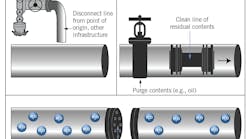Eric Watkins
Senior Correspondent
LOS ANGELES, Feb. 24 -- Design work on Russia's proposed Eastern Siberia-Pacific Ocean (ESPO) oil pipeline is proceeding according to schedule, even though the duration of the related environmental study has been extended, Industry and Energy Minister Viktor Khristenko said Feb. 21.
"I have no reason to say that we will go beyond the deadline set for the first stage of construction," he said. Last June, Khristenko said that the first section of the pipeline would be laid in 2008 and that two oil companies—Surgutneftegaz and OAO Yukos—would provide the crude oil to fill it (OGJ Online, June 8, 2005).
Russian Prime Minster Mikhail Fradkov signed a resolution on Dec. 31, 2004, to build the ESPO pipeline with a total capacity of as much as 80 million tonnes/year of crude, along with the use of railway capacity.
The first stage of the project calls for construction of a 2,400-km oil pipeline from Taishet in Eastern Siberia to Skovorodino near the Chinese border and of a rail oil terminal at the Perevoznaya Bay at a cost of $7.9 billion. The second phase, depending on the development of Eastern Siberian oil fields, involves construction of the further link between Skovorodino and Perevoznaya on Russia's Pacific Coast.
China looks to import as much as 30 million tonnes/year of crude if a pipeline spur is built from Skovordino to Daqing, while supplies along the Skovorodino-Perevoznaya route would come to 50 million tonnes/year, with exports mostly aimed at Japan.
Transneft has completed a feasibility study of the project, and Rostekhnadzor, Russia's federal environmental and technological regulator, was to confirm the environmental study for the first stage of the project by Jan. 25.
Rostekhnadzor extended the deadline for the expert commission for 30 days after most experts rejected the study, saying the route proposed by Transneft extended just 800 m from Lake Baikal. Moreover, Russia's Natural Resources Ministry wants the terminus moved from Perevoznaya to Nakhodka (OGJ, Feb. 20, 2006, Newsletter).
Meanwhile, Transneft said several key players along the proposed route continue to insist on branches from the pipeline.
Khabarovsk Territory Gov. Viktor Ishayev wants to include the construction of branch lines to refineries in Khabarovsk and Komsomolsk-on-Amur, saying they would help avoid the dependence on railroads for oil shipments and would triple output.
Contact Eric Watkins at [email protected].
